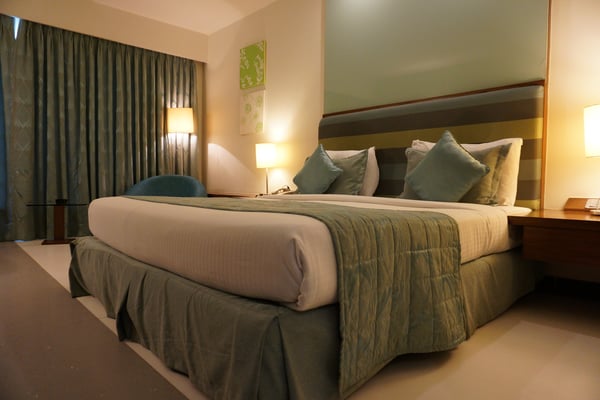
Most buildings will experience some sort of water issue at some point, and hotels are no exception. In fact, hotel rooms are more prone to water intrusion simply due to the nature of the design and their use.
It is important to remember as hotel owners, managers, and designers that vigilance and proactive action is the best way to protect against potential issues from water and moisture damage.
Being proactive against possible water issues that could lead to dangerous and expensive mold and moisture in hotel rooms is so much less expensive and disruptive than ignoring costly warning signs that could cost a fortune.
How to Prevent Mold and Moisture in Hotel Rooms
- Follow manufacturer instructions
- Control the temperature
- Dehumidify
- Limit external air flow
- Store furniture properly
- Perform proper cleaning techniques
Savvy hotel professionals know that moisture and hotel rooms simply do not mix well. Fortunately, there are care and storage considerations that can help limit mold and overall moisture within hotel rooms.
Taking a few extra steps now can really pay off in the future. Here are some things to consider:
Follow Manufacturer Instructions
Be sure to follow the manufacturer’s care and cleaning instructions included with your hotel furniture.
Since the company designed and made the furniture, they are the most knowledgeable as to the best way to care for it and clean it, which will keep possible mold from growing due to moisture in the hotel room.
Control the Temperature
The “dew point” is the temperature when air can no longer contain all its moisture in suspension, so it releases some of it in the form of water drops.
When hotel rooms have temperatures below the dew point, moisture can condense on the walls, which is then absorbed by the furniture and bedding in the room.
Optimize guest room temperatures to eliminate humidity, moisture, and mold.
Dehumidify
Hotels rooms are the perfect space for HVAC units that contain a built-in dehumidifier to control and prevent excess moisture by keeping the humidity at bay.
The careful planning and design of the HVAC system to keep humidity levels lower than 70% to control mold growth can help with preventing moisture issues in hotel rooms.
Limit External Air Flow
Controlling the external airflow can be difficult in hotel rooms due to the absence of a well-sustained negative pressure.
External airflow can lead to the contamination of adjacent rooms as well as corridors and should be limited when possible.
Store Furniture Properly
If you have the need to store furniture prior to installation, avoid keeping it in high humidity areas, as this can lead to musty smelling furniture and possible mold growth.
Proper Cleaning Techniques
Ensure the cleaning staff is properly trained on procedures if moisture is present in a hotel room.
In addition to a thorough visual inspection each time a room is cleaned, all properties should prepare a routine moisture inspection plan of all rooms on a regular basis.
Keep Your Guests Comfortable
Protecting your hotel with proper design and preventative maintenance is crucial for the comfort of your customers.
Paying special attention to the proper storage of hotel furniture and the right cleaning techniques can help ensure your hotel room is in tip top shape for your guests so they give you outstanding reviews and become repeat customers.

